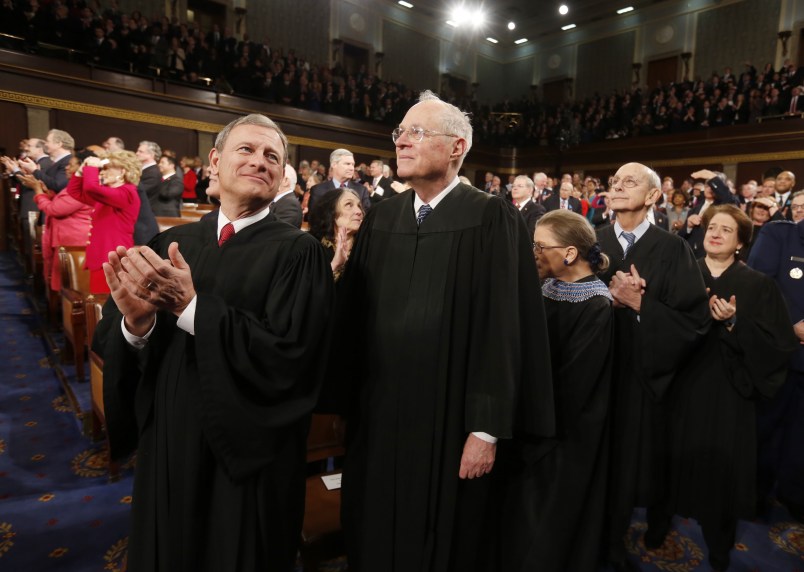In a sharply divided ruling Wednesday, the Supreme Court further eroded campaign finance laws by striking down limits on the total amount that an individual may donate across political candidates and committees in an election cycle.
The decision — written by Chief Justice John Roberts and joined by Justices Antonin Scalia, Anthony Kennedy and Samuel Alito — held that “aggregate limits are invalid under the First Amendment.” Justice Clarence Thomas concurred with the other conservative justices but penned a separate opinion arguing that campaign finance restrictions should be wiped out further.
The conservative justices argued that eliminating aggregate cont limits doesn’t give rise to “quid pro quo corruption” which the court recognized as a legitimate rationale for campaign finance restrictions in the landmark Buckley v. Valeo case in 1976.
“Spending large sums of money in connection with elections, but not in connection with an effort to control the exercise of an officeholder’s official duties, does not give rise to such quid pro quo corruption,” Roberts wrote in the ruling. “Nor does the possibility that an individual who spends large sums may garner ‘influence over or access to’ elected officials or political parties.”
The law currently permits individuals to spend no more than $2,600 per election per candidate, allowing for up to $5,200 for a primary and general election. The aggregate limit is $48,600 on contribution to candidates for an election cycle, and $74,600 on campaign committees. The Supreme Court ruling keeps the individual limits and eliminates the aggregate limits. Supporters of the law noted that without limits, a single donor could contribute as much as $3.6 million to helping a single politician, between giving to the candidate and committees supporting him or her.
“There is no right more basic in our democracy than the right to participate in electing our political leaders,” Roberts declared. “[W]e conclude that the aggregate limits on contributions do not further the only governmental interest this Court accepted as legitimate in Buckley [v. Valeo].”
Roberts’ opinion also argued that the Internet has made the public disclosure of campaign contributions an even more effective curb to corruption than when Buckley was decided in the 1970s. In an ironic line, he cited the work of two well-known campaign finance watchdogs as justification for the decision: “Reports and databases are available on the FEC’s Web site almost immediately after they are filed, supplemented by private entities such as OpenSecrets.org and FollowTheMoney.org.”
The dissent, written by Justice Stephen Breyer on behalf of the four liberal justices, derided Roberts’ opinion as “fatally flawed.”
The case, McCutcheon v. FEC, was brought by Shaun McCutcheon, an Alabama-based engineer and political donor and the Republican National Committee. It was argued in October. The decision is also a victory for Senate Minority Leader Mitch McConnell (R-KY), an ardent opponent of campaign finance laws, who called on the court to strike down the law.
The ruling builds on the hyper-controversial Citizens United ruling of 2010, which permitted corporations, unions and independent groups to spend unlimited amounts of money to influence elections.
Transparency groups were livid.
“Today’s decision in McCutcheon v FEC is Citizens United round two, further opening the floodgates for the nation’s wealthiest few to drown out the voices of the rest of us,” Miles Rapoport, the president of Common Cause, said in a statement. “The Court has reversed nearly 40 years of its own precedents, laid out a welcome mat for corruption, and turned its back on the lessons learned from the Watergate scandal.”






